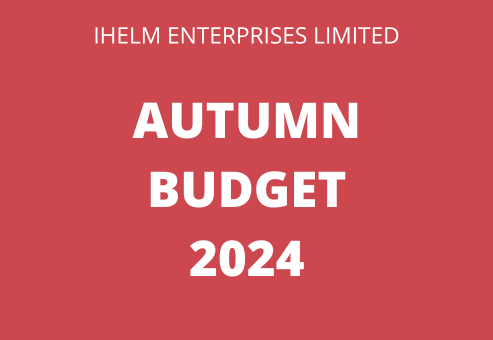On October, 30th, 2024, the UK Chancellor, Rachel Reeves, announced the Autumn 2024 Budget. I will be looking at the announcements that will affect businesses in the UK and the blog post will only touch on some of the main highlights of the Autumn Budget. You can read the full budget on the HMRC website here.
- Minimum Wage Increases from April 2025:
National Living Wage for those 21 years and over will increase from £11.44/hour to £12.21/hour.
National Minimum Wage for 18-20-year-olds will rise from £8.60/hour to £10.00/hour.
National Minimum Wage for 16-17-year-olds will rise from £6.40/hour to £7.55/hour.
Apprentice Rate for those eligible and under 19 years old, or those over 19 years old and in their first year of an apprenticeship – will rise from £6.40/hour to £7.55/hour. - Changes to National Insurance for Employers:
The National Insurance Employers Allowance will increase from £5,000 to £10,500 for those employers who are eligible to claim the allowance from April 2025. The government is also removing the £100,000 threshold which expands the NI Employer’s Allowance to all eligible employees. Please note that sole director limited companies where there are no other staff members on the payroll are not eligible for this discount.
The Employer’s National Insurance Rate will increase from 13.8% to 15% from April 2025.
The amount at which employers pay National Insurance on employee wages will drop from £9,100 a year to £5,000 a year from April 2025 and will remain in place up to, and including, the 2027/2028 tax year. - Stamp Duty on the purchase of second homes, buy-to-let residential properties and companies purchasing rental property in England and Northern Ireland will increase from 3% to 5% from 31/10/2024.
- Business Rates
For the 2025/2026 tax year, retail, hospitality and leisure (RHL) properties, will have the existing 75% relief for eligible properties in England replaced by 40% relief with a max discount of £110,000.
From April 2026, there will be permanent lower business rate multipliers for RHL properties with a higher multiplier for properties with Rateable values above £500,000.
The small business multiplier is frozen at 49.9p for 2025/26. - Corporation Tax
Corporation Tax will be capped at 25% for the duration of Parliament and the Small Profits Rate and marginal relief will be kept at the current rates and threshold. - AIA, Writing Down Allowance
The government will continue to maintain permanent full expensing, £1 million AIA, writing down allowance and Structure and Buildings Allowances. - P11D (Employee Benefits)
From April 2026, employers will be required to report and pay tax and Class 1A NICs on employee benefits in kind on a real-time basis, except for accommodation and employment-related (beneficial) loans. - Zero-Emission Cars
The 100% first-year allowance for qualifying expenditure on zero-emission cars and electric vehicle charge points will be extended to 31/03/2026 for Corporation Tax Purposes and 05/04/2026 for income tax. - Making Tax Digital
Those with self-employed and/or rental income of more than £50,000 will be required to submit via MTD from April 2026.
Those with self-employed and/or rental income of more than £30,000 will be required to submit via MTD for April 2027.
It has been confirmed that those with self-employed and/or rental income of more than £20,000 will be required to submit by the end of the current Parliament session. - Tax Liabilities
The late payment interest rates on unpaid tax liabilities for employers will increase by 1.5% from 06/04/2025. The current rate is set as the Bank of England base rate plus 2.5%. - Personal Allowance and Tax Thresholds
The personal allowance and tax thresholds for England, Wales and Northern Ireland will continue to be frozen until the 2027/2028 tax year. The rates will be changed from the 2028/2029 tax year.
Scotland sets their own rates for Scottish Taxpayers. - Company Car Tax Rates 2028/2029 and 2029/2030
The Autumn Budget has set rates for Company Car Tax (CCT) for 2028/2029 and 2029/2030. This will help to provide long-term certainty for taxpayers and the industry.
Appropriate Percentages (APs) for zero-emission and electric vehicles will increase by 2 percentage points per year.
APs for cars with emissions of 1-50g of CO2 per kilometre will rise in 2028/2029 to 18% and in 2029/2030 to 19%.
APs for all other vehicle bands, including the maximum AP, will increase by 1 percentage point per year.
As I develop a better understanding of the Autumn Budget, through information provided by my bookkeeping association, I will update this blog post to reflect that.

